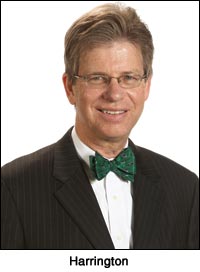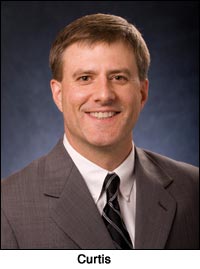Firm sees opportunity in green program
By: Jack Zemlicka, [email protected]//September 1, 2010//
 A law firm teaming up with the Department of Natural Resources may seem like an odd partnership.
A law firm teaming up with the Department of Natural Resources may seem like an odd partnership.
But Godfrey & Kahn’s Arthur J. Harrington expects it to be an innovative and beneficial one.
In March, the Milwaukee-based law firm was the first in the state to apply for membership in the DNR’s Green Tier program, which is designed to recognize companies committed to exemplary environmental performance.
While many of the 36 participants in Tier 1 of the program are product-based companies, such as Holsum Dairies LLC and Frito-Lay Beloit, Harrington said there is an opportunity for service organizations like law firms to benefit.
“The big issue is how do you distinguish your firm when you are competing with five or six other large firms in the state?” Harrington said. “I think clients who have that environmental focus are looking at what their service provider is doing, and we want to be in a position to look at those opportunities.”
While the program is voluntary and there is no application cost, admission requires more than cutting back on a few copies and turning off the lights at night.
DNR Environmental Policy specialist Thomas Eggert said the focus goes beyond compliance and requires companies to implement an Environmental Management System (EMS), which is essentially a detailed checklist of goals, within one year.
For Godfrey & Kahn, that includes an assurance that employees are on board with the concept.
“Can you in some way encourage partners to purchase hybrid cars?” asked Eggert. “Or can you get a law firm to print on both sides of paper? Lawyers don’t like doing that.”
If the firm is accepted into the program, the DNR will conduct annual progress evaluations to include an assessment of the client’s environmental policies.
Harrington, who is a member of the Green Tier Advisory Board, admitted that there is some risk associated with the firm’s commitment to the program and it’s often easy to “walk the walk, but not talk the talk.”
The firm established a Green Office Policy in 2007, which included a conversion to Energy Star-rated office equipment and paperless fax machines that save an electronic copy of the document, but he said the new program will require a more regimented approach.
One possibility is metering energy usage on a floor-by-floor basis and charting those figures to establish benchmarks for the future.
The firm’s Green Office Committee also plans to track the number of paper copies produced, cases of paper ordered per month and energy-efficient light bulb usage.
In addition, the committee plans to research a prospective new location in an energy-efficient office building.
“The biggest cost on something like this is people time spent by meeting, implementation and approval of all these things and then oversight to make sure the practices are being followed,” Harrington said.
But he said the potential rewards are worth the effort.
Several national and international companies based in Wisconsin have strengthened their environmental policies and are increasingly looking for service providers that share the same “green” philosophy.
“I suspect that a number of law firms are scrambling to find out what they need to do,” Eggert said.
Harrington added that new attorneys are also expressing an interest in working for a firm that is environmentally conscious.
“It’s has really become a benefit in hiring,” he said.
 Madison-based Axley Brynelson is researching the program, but the firm’s green initiatives leader, attorney Paul D. Curtis, said it’s not something they are pursuing at the moment.
Madison-based Axley Brynelson is researching the program, but the firm’s green initiatives leader, attorney Paul D. Curtis, said it’s not something they are pursuing at the moment.
He said it is simply a matter of weighing the costs of implementing a firm-wide environmental policy versus the benefit for the mid-size firm.
“I don’t doubt other firms looking into it,” he said. “But initially, it’s going to cost firms money and that’s the tough sell to partners.”
Curtis said it also takes time to change the mindset of attorneys who are used to doing things a certain way.
“Some people are unwilling to take that extra step,” he said. “Green is so new and it’s a slow process to train and change the way people think.”
Jack Zemlicka can be reached at [email protected].
Legal News
- State Bar leaders remain deeply divided over special purpose trust
- Former Wisconsin college chancellor fired over porn career is fighting to keep his faculty post
- Pecker says he pledged to be Trump campaign’s ‘eyes and ears’ during 2016 race
- A conservative quest to limit diversity programs gains momentum in states
- Wisconsin prison inmate pleads not guilty to killing cellmate
- Waukesha man sentenced to 30 years for Sex Trafficking
- 12-year-old shot in Milwaukee Wednesday with ‘serious injuries’
- Milwaukee man convicted of laundering proceeds of business email compromise fraud schemes
- Giuliani, Meadows among 18 indicted in Arizona fake electors case
- Some State Bar diversity participants walk away from program
- Wisconsin court issues arrest warrant ‘in error’ for Minocqua Brewing owner
- Iranian nationals charged cyber campaign targeting U.S. Companies
WLJ People
- Power 30 Personal Injury Attorneys – Russell Nicolet
- Power 30 Personal Injury Attorneys – Benjamin Nicolet
- Power 30 Personal Injury Attorneys – Dustin T. Woehl
- Power 30 Personal Injury Attorneys – Katherine Metzger
- Power 30 Personal Injury Attorneys – Joseph Ryan
- Power 30 Personal Injury Attorneys – James M. Ryan
- Power 30 Personal Injury Attorneys – Dana Wachs
- Power 30 Personal Injury Attorneys – Mark L. Thomsen
- Power 30 Personal Injury Attorneys – Matthew Lein
- Power 30 Personal Injury Attorneys – Jeffrey A. Pitman
- Power 30 Personal Injury Attorneys – William Pemberton
- Power 30 Personal Injury Attorneys – Howard S. Sicula











